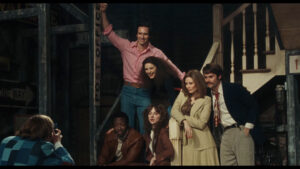
“Saturday Night” begins with onscreen text of a famous Lorne Michaels saying:
We don’t go on the air because the show is ready. We go on because it’s 11:30.
That sounds ominous — except to those of us who have done live broadcasts. In the forty years I was on the radio, I faced similar deadlines thousands and thousands of times. I had to have something to say when the commercials or songs ended or risk the dreaded dead air. Every local TV newscast does the same. So does “SportsCenter.” “Saturday Night Live” isn’t alone in facing a ticking clock.
I suppose Jason Reitman, director of “Saturday Night,” was up against a deadline, too. He wanted his movie to hit theaters on October 11, the forty-ninth anniversary of the debut of “SNL” on NBC. If only he had taken more time to trim it.
Like the run-through for the original show, the movie is packed with too much stuff. The difference is that Lorne Michaels cut a lot of the extra material in order to make the show fit in a ninety minute hole. Reitman, on the other hand, padded his production with stories that were not part of the original timeline in order to expand his movie to last ninety minutes. I’m not going to bother listing them, because Reitman deserves some artistic license, but I know enough about the show’s history to spot things that were out of place.
But I will mention a couple of sequences with JK Simmons as Milton Berle which make it seem as though Berle was rehearsing a primetime special at 30 Rock on that October night. Though Berle was such a big star in the forties and fifties that he was known as “Mr. Television,” he was old news by 1975. Yes, he still made guest appearances on sitcoms and variety shows, part of a three-decade-long contract he had with NBC, but he hadn’t done his own show for over 15 years, and there was no way he was hosting one at that point. But Reitman has Berle go to Studio 8H to see what the kids are up to and is confronted by Chevy Chase (Cory Michael Smith), who’s not too happy seeing Berle hit on his girlfriend, and gets a verbal dressing-down from the TV veteran.
The whole scene seems designed to get in a mention of Berle’s famously long penis (which is never shown, fortunately). What that has to do with the origin story of “SNL” I do not know, although Berle did host an episode in the fourth season of “SNL.” It was regarded at the time (and still today) as one of the worst in the series, so bad Michaels refused to allow it be rerun or even included in compilations for many years.
“Saturday Night” is well cast. Gabriel LaBelle (from Spielberg’s “The Fabelmans”) is fine as Lorne Michaels, keeping his cool in the midst of utter chaos. The actors playing the Not Ready For Primetime Players all do a pretty good job of embodying and sounding like those original cast members. In particular, Lamorne Morris has the vocal cadence of Garrett Morris (no relation) down, except for one scene in which he sounds more like JB Smoove. As John Belushi, Matt Wood overdoes the tortured genius with a hair-trigger temper, but at least he can make raising one eyebrow funny. Dylan O’Brien recreates Dan Aykroyd perfectly.
Sadly, the show’s three female stars — Laraine Newman (Emily Fairn), Jane Curtin (Kim Matula), and Gilda Radner (Ella Hunt) — are given short shrift, just as they were in the early days of the show. The standout performance is by Rachel Sennott as Rosie Shuster, who was not only one of the best writers on the show, but also Michaels’ wife at the time — and Aykroyd’s girlfriend.
The supporting cast includes Willem Dafoe as NBC executive Dave Tebet, Cooper Hoffman as Dick Ebersol, Robert Wuhl as “SNL” director Dave Wilson, Brad Garrett as a Borscht Belt comic, Jon Batiste as Billy Preston, Tracy Letts as Herb Sargent, and Nicholas Braun (“Succession”) as both Jim Henson and Andy Kaufman.
When Aaron Sorkin created “Studio 60 On The Sunset Strip,” he had never written sketch comedy and didn’t know how to make those pieces of his fictional late night show work. Reitman has an advantage, since he’s working from the original “SNL” script. But his movie isn’t about that any more than Sorkin’s show was. It’s about what went on behind the scenes, the pressure building on everyone involved, and whether or not Michaels and company would be able to get it together by airtime.
Watching a movie about an event when you know what actually happened can still be dramatic. “Apollo 13” remains the best example of that. We knew that Jim Lovell, Fred Haise, and Jack Swigert returned to Earth safely, but were still on the edges of our seats thanks to director Ron Howard’s skill at framing the “will they die in space” story so well.
“Saturday Night” doesn’t quite pull that off. With the benefit of hindsight, we know the show did go on the air at 11:30pm ET, and continues to do so 49 years later. I’m just not convinced that there’s a big enough audience now that’s interested in watching a SparkNotes version of how it began.
I give “Saturday Night” a 6 out of 10. Now playing in theaters.
